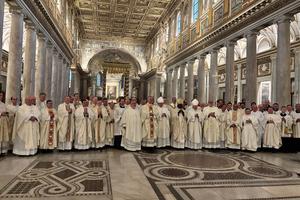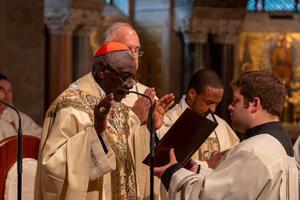Cardinal Sarah Promotes Advent Launch of ‘Ad Orientem’ Liturgical Renewal
In a July 5 address, the prefect of the Vatican’s Congregation for Divine Worship also disclosed that Pope Francis has commissioned him to study a possible ‘reform of the reform’ of the liturgy.

LONDON — The Pope’s chief liturgical official has called on all Catholic priests to start offering Mass ad orientem (facing east), beginning on the first Sunday of Advent.
Guinean-born Cardinal Robert Sarah, 71, who holds the post of prefect of the Congregation for Divine Worship and the Discipline of the Sacraments, made his comments during the keynote opening address of the Sacra Liturgia conference taking place in London from July 5 to 8.
During his speech to a packed auditorium of around 200 people, Cardinal Sarah said: “You may have read my article of June 2015 in L’Osservatore Romano, and my recent interview in May this year, with the French journal Famille Chrétienne.
“On both occasions, I stated that I believe it is very important that we return as soon as possible to ad orientem worship; priests and congregation facing same direction, eastwards, or at least towards the apse, towards the Lord who comes, at those points when we address God in the liturgical rite.”
Ad orientem worship involves the priest and congregation facing the same direction, the liturgical “east,” rather than priest and congregation facing each other (versus populum) during Mass. The east has significance as the place where the sun rises, symbolizing the resurrection of Christ and his second coming.
Advocates say it better focuses the priest and congregation on worshipping God together, rather than creating an inward-looking community feel. They also cite the antiquity of the practice, which goes back to the first centuries of the Church and is still practiced in traditional Catholic parishes and religious orders.
The cardinal continued: “This practice is permitted by current liturgical legislation. It is perfectly legitimate. Indeed, I think that it is a very important step, to make sure God is truly at the center of our celebration.
“And so, dear fathers, I ask you to implement this practice whenever possible, with prudence and the necessary catechesis and pastoral competence, knowing that this is something good for the Church and the people of God.
“You as pastors can determine how and when this is possible, but perhaps begin this on the first Sunday of Advent.”
The audience immediately broke into applause.
Among those present as the cardinal launched his initiative were Archbishop Salvatore Cordileone of San Francisco, Bishop Dominique Rey of the French Diocese of Fréjus-Toulon, and Msgr. Keith Newton, head of the Personal Ordinariate of Our Lady of Walsingham.
Cardinal Sarah continued: “Dear fathers, we should listen again to the words of Our Lord in the book of the prophet Jeremiah: ‘They have turned their backs to me.’ Let us turn again towards the Lord.” His words were greeted with renewed applause and laughter.
During his concluding remarks, Bishop Rey, who is also the convenor of the conference, announced that he would be implementing the cardinal’s initiative in his own diocese beginning on the First Sunday of Advent, which will include a letter of encouragement to his priests and ad orientem Masses celebrated by him in the diocesan cathedral.
Cardinal Sarah was ordained a priest at the age of 24 and appointed archbishop of Conakry, Guinea, by St. John Paul II in 1979 when he was 34 years old, making him the youngest bishop in the Church at that time.
In 2001, St. John Paul II called Cardinal Sarah to the Vatican, where he held a number of senior posts. In November 2014, Pope Francis chose Cardinal Sarah as the new prefect of the Vatican department responsible for liturgical matters.
Reform of the Reform
During his speech, Cardinal Sarah also revealed that Pope Francis has commissioned him to make a study of the question of how the two forms of the Roman rite of Mass — the extraordinary form, which predates the Second Vatican Council and is commonly known as the Tridentine Mass or Traditional Latin Mass, and the ordinary form (novus ordo), introduced by Blessed Paul VI in 1969 — can “mutually enrich one another.”
“We can’t dismiss the possibility or desirability of an official reform of the liturgical reform,” said Cardinal Sarah.
“In April 2015, the Holy Father asked me to study the question of the ‘reform of the reform,’ looking at how the two forms can enrich one another.”
“It’s a delicate work that requires patience and prayers, so that we have a more faithful implementation of Vatican II’s Sacrosanctum Concilium,” he said.
Sacrosanctum Concilium is Vatican II’s document on Catholic liturgy and was the first document discussed and approved at the Council in December 1963.
Cardinal Sarah regretted the failures to properly implement the liturgical vision of Sacrosanctum Concilium, singling out the proposals and inferences not called for or present in the document.
“Even Archbishop [Annibale] Bugnini, the secretary to the commission tasked with reforming the liturgy, admitted that some prayers and rites were constructed and revised according to the spirit of the times, in particular to ecumenical sensitivities.”
The cardinal also criticized priests who stepped aside to let laypeople distribute holy Communion, calling it “wrong” and a denial of priestly ministry and a clericalization of the laity: “It’s a sign that priestly formation has gone very wrong and needs to be corrected.”
He also had strong words for priests and bishops who use cameras and phones during Mass to take photos, particularly at large concelebrated Masses, calling it “terrible” and a “sacrilege.”’
“Where are the faithful of whom the Council Fathers spoke? Many of the faithful are now unfaithful. They do not come to the liturgy at all.”
“St. John Paul II said that may Christians are living in a state of silent apostasy. They live as if God does not exist,” Cardinal Sarah warned.
“Let’s take the personal motto of St. Pius X — ‘Restore all things in Christ’ — and make it our standard.”
Daniel Blackman writes from London.
- Keywords:
- cardinal robert sarah
- daniel blackman
- pope francis
- sacrosanctum concilium
- st. john paul ii
- the mass















